Lynx captured after illegal release in Highlands
Two lynx illegally released in the Highlands have been successfully captured by the Royal Zoological Society of Scotland (RZSS).
The alarm was raised at about 16:20 on Wednesday when they were spotted in the Drumguish area, near Kingussie.
Experts from the charity worked with police to humanely trap the cats overnight. They are now being cared for in quarantine facilities at Highland Wildlife Park before being transferred to Edinburgh Zoo.
The charity has condemned the illegal release as "highly irresponsible" and said it was likely the lynx would have died in the wild.
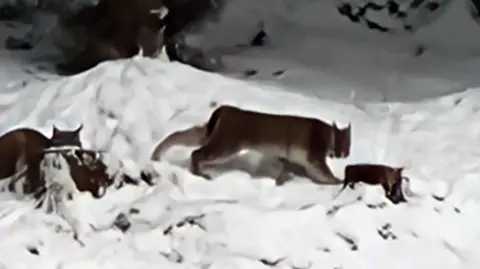 RZSS
RZSSIt said the pair appeared to be in good health and had been named "The Killiehuntly Two".
Police Scotland has urged anyone with information on how the cats came to be in the area to contact its non-emergency line.
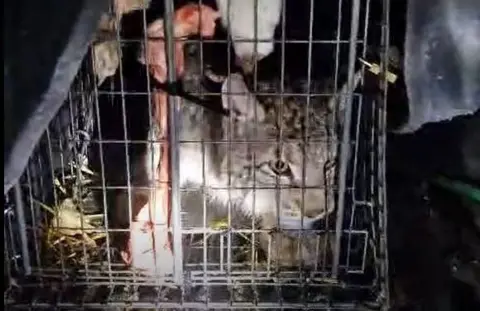 RZSS
RZSS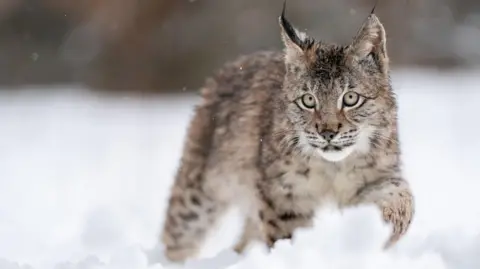 Getty Images
Getty ImagesDavid Barclay, manager of the RZSS Saving Wildcats team, said they set live trail cameras near baited traps to capture the animals.
"It was a long night for our specialist keepers who were taking turns to monitor any activity," he said.
"It was amazing to see the lynx being captured safely and humanely, which makes the lack of sleep more than worth it.
"Biosecurity laws mean the cats need to spend 30 days in suitable quarantine facilities, so we will transfer them from Highland Wildlife Park to Edinburgh Zoo, where we will further assess their health and welfare."
He said the cats may eventually return to Highland Wildlife Park, which is near where they were trapped, "though it is too early to say for certain".
Highland Wildlife Park is already home to two grown Northern Lynx, named Switch and Neon. The Northern Lynx is a subspecies of the Eurasian Lynx.
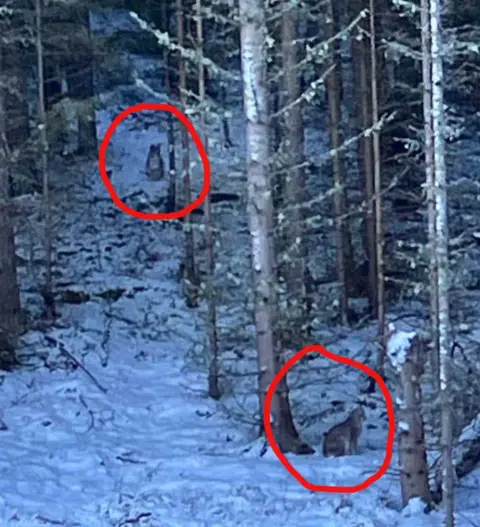 Peter Jolly
Peter Jolly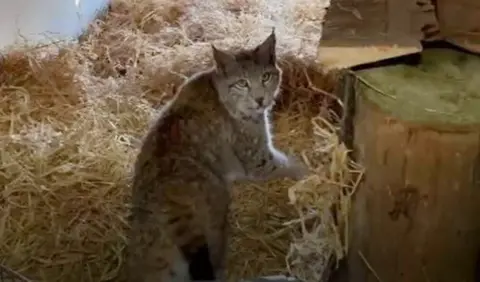 RZSS
RZSSRZSS chief executive David Field said the charity condemned the release of the lynx "in the strongest possible terms".
He said: "It was a highly irresponsible act and it is very unlikely they would have survived in the wild due to a lack of adequate preparation.
"Their abandonment was reckless to the animals, public, the community and nature."
"We are extremely grateful to all the residents, estates, farmers and conservation partners locally that provided information to us and the police."
First Minister John Swinney also condemned the release.
He told MSPs in the Holyrood chamber he was "enormously grateful" to the organisations who contributed to the safe capture of the animals.
Are lynx dangerous?
Lynx are not considered dangerous to humans and they tend to avoid contact with people.
They prey on mammals, like deer, rabbits, and mice, as well as some species of birds.
The powerful hunters stalk their prey before pouncing on them in a surprise attack.
An adult cat measures between 55–75cm (22-30in) at shoulder height and between 90-110cm (35-43in) in length.
Lynx were once native to Britain, but were driven to extinction 500 to 1,000 years ago.
This was due to habitat loss and hunting, as well their prey becoming more rare.
The big cats live up to 17 years in the wild, but they can live for more than 20 years in captivity.
Some conservation groups have been campaigning to have the wild cats reintroduced to Scotland.
Lynx to Scotland, a three-charity partnership working to restore lynx to the Scottish Highlands, welcomed the news of the humane capture.
Peter Cairns, executive director of Scotland: The Big Picture, one of the charities involved, said: "The Lynx to Scotland Project is working to secure the return of Lynx to the Scottish Highlands, but irresponsible and illegal releases such as this are simply counter-productive."
RSPB Scotland said it was collaborating with the police, relevant governing bodies and partner organisations.
A spokesperson said: "Whilst we support lynx reintroduction as a formerly native species to Scotland, we work within official conservation translocation guidelines and therefore do not support unofficial releases which only set back approved conservation projects."

Sign up for our Future Earth newsletter to get exclusive insight on the latest climate and environment news from the BBC's Climate Editor Justin Rowlatt, delivered to your inbox every week. Outside the UK? Sign up to our international newsletter here.
